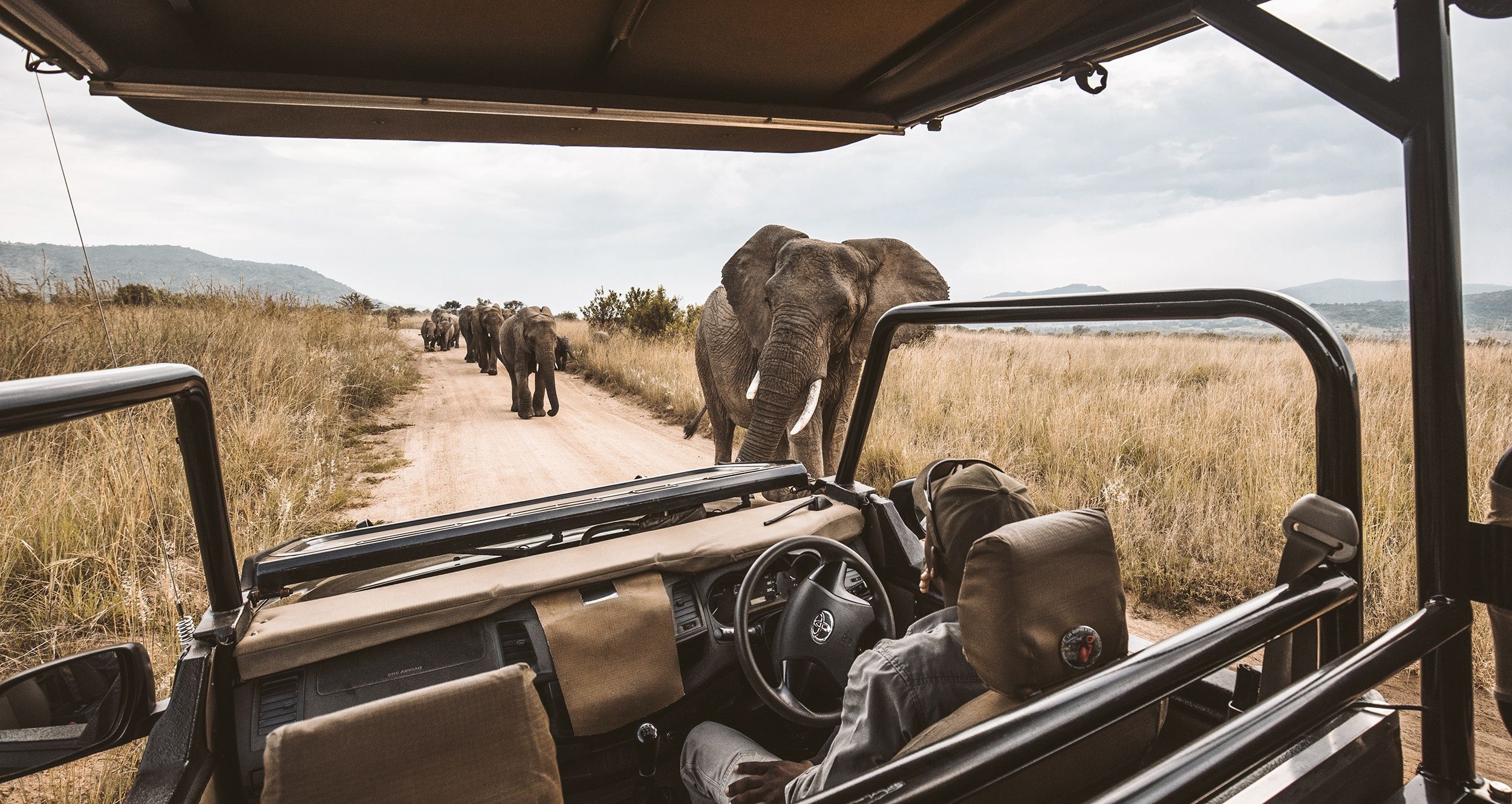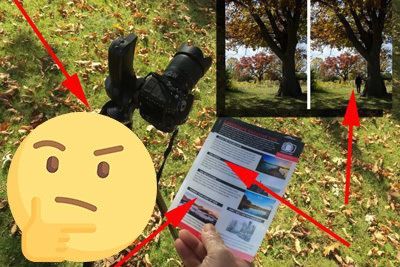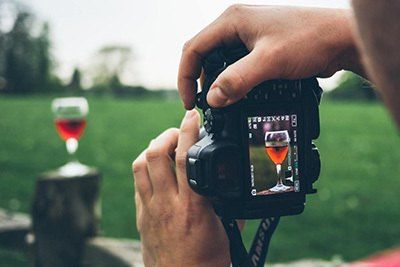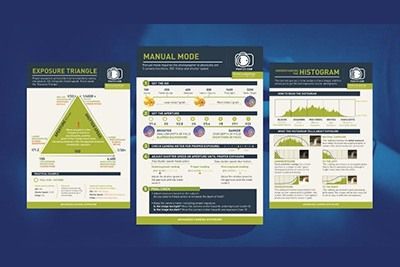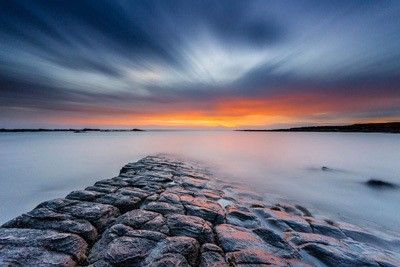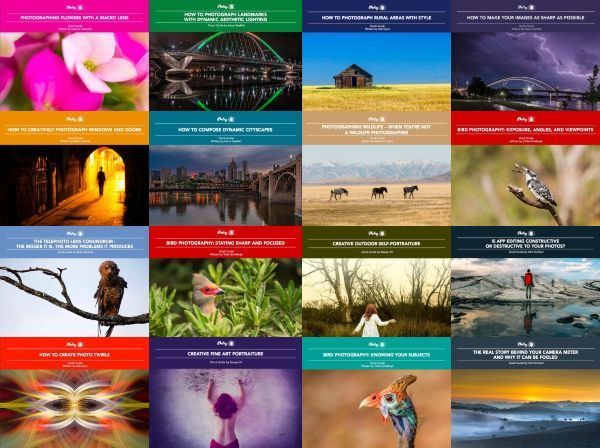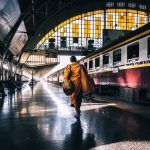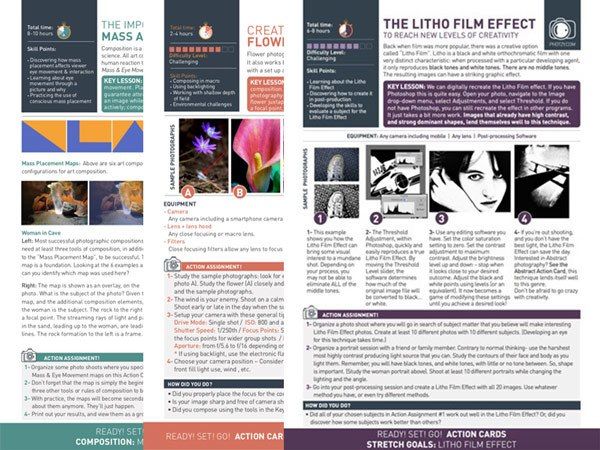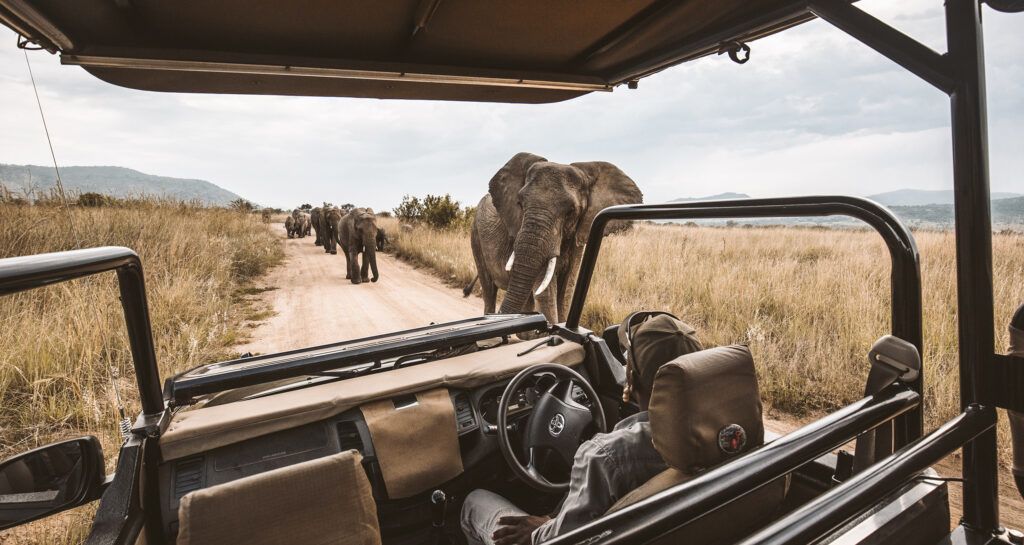Introduction
Aaah, ‘African Safari’! The words that generate images in your mind of dirt roads, amazing sunsets, roaring lions, and magic photographic opportunities.
Is this true? Well, more often than not – I hope so in your case! Every time at the end of one of my photo safaris, I start dreaming of the next one. It just does something for and to the soul.
An African Safari forces you to come to a standstill for a few days and makes you appreciate the things that matter. It reminds you of the fact that you are just a dust particle on a planet that is in turn just a dust particle in the midst of a majestic universe. It reminds you that you need to appreciate life because life is a gift – a temporary gift that may be claimed back from you in a flash when you least expect it or want to return it.
If this is not your first safari experience, then maybe you need to try another – at a more distant place, with more earthly experiences. Knowing Africa and its excellent safari venues, though, I’m convinced that you’re going to be impressed!
I hope that by now I have at least made your heart rate go faster in anticipation of your first African safari!
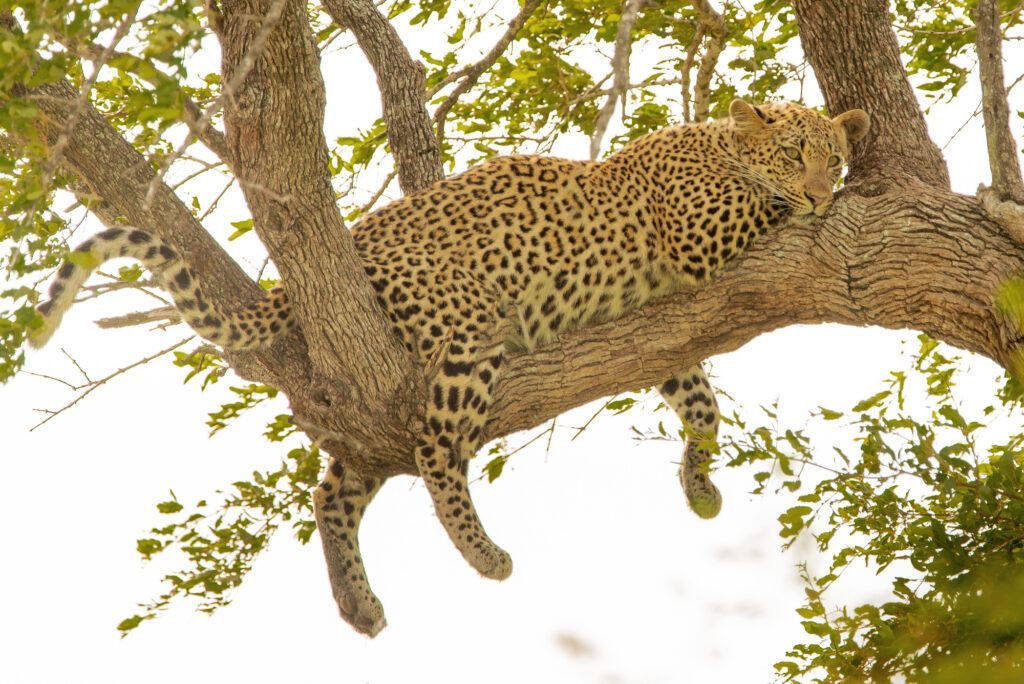
Photograph by Tobie Schalkwyk
What will you learn in this guide?
In this guide, we will have a look at a few things to keep in mind when preparing for your first African Photo Safari to make it a most enjoyable, productive experience – an experience that will make you fall in love with photo safaris instead of reminding you of something unpleasant which you never want to do again.
Just a heads-up: don’t be fooled by the ‘Three Tips’ in the title. This is actually a variety of tips grouped in three sections.
If this is not your first safari experience, then maybe you need to try another – at a more distant place, with more earthly experiences.
This guide is directed at the photographer going on his/her first African Photo Safari, but it may be as useful to anyone planning a safari, to remind them of a few things to take with them or to prepare for.
I will focus mostly on an open vehicle safari where a guide will also be the driver of the vehicle.
I was going to write a ‘Five Tips’ guide at first, but I quickly realized that five tips will hardly scratch the surface and will not be helpful at all. I’d thus rather group various tips under specific headings and trust that they will be more useful to you.
Recommended Reading: Want to learn how to make your photos stand out from everyone else’s? Grab a copy of Photzy’s Effective Storytelling premium guide.
Tip #1: Hone Your Skills
Preparation is always important for any event in life, especially if you will be away from home for a while. Even more so when you’re going to find yourself in an area far removed from civilization.
1. Decide on a Shooting Mode
If this is your first safari, then you may be relatively new to photography. If you’re not at ease with Manual shooting mode yet, opt for Shutter Priority mode so that you are in control of your shutter speed (different subjects will require different shutter speeds). You may also want to consider using Auto ISO.
2. Practice Your Selected Shooting Mode
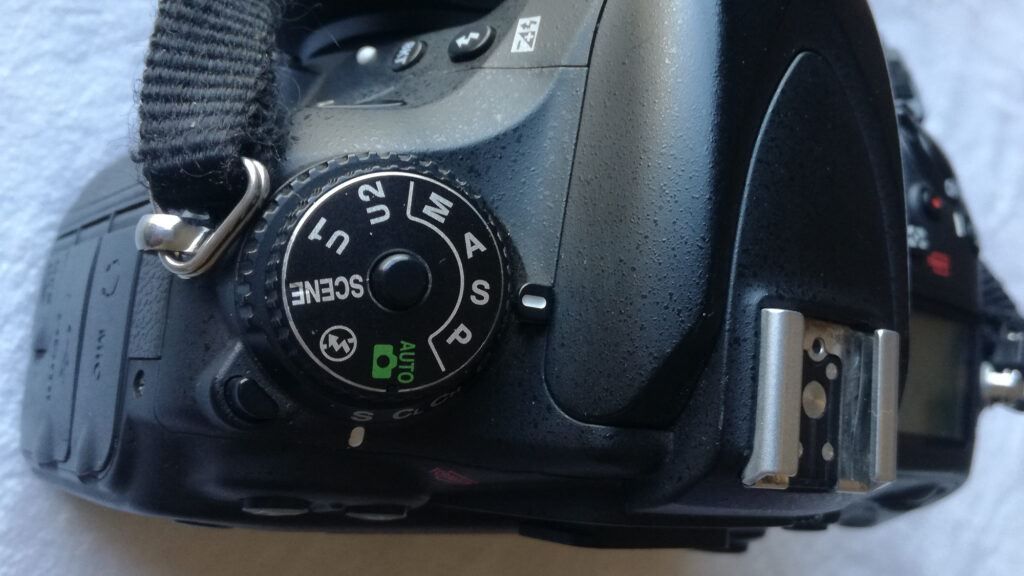
Photograph by Tobie Schalkwyk
Nothing is as frustrating as missing a once-in-a-lifetime image just because you were fiddling with your settings or you used them incorrectly. Practice quick adjustments and see what the effect is.
3. Preselect Your Chosen Settings
You may be using your camera for other things after the above preparation, so make sure that you have re-selected the settings before finally packing your camera for the trip.
4. Practice Quick Lens Changes
Lens changes are not recommended on safaris (to keep dust away from your camera’s sensor), but who knows what may happen that requires an urgent lens change? Practice changing lenses in almost total darkness or darkness with your headlamp.
Key Lesson: Your safari actually starts here at the preparation stage. Don’t rush it. Enjoy every moment of it. Do it well. Whatever you end with here will set the trend for the rest of your journey.
Tip #2: Pack the Essentials
This step can make or break your trip. Just the lack of an additional battery or memory card can ruin your safari. Pack the following:
1. Extra Battery Power
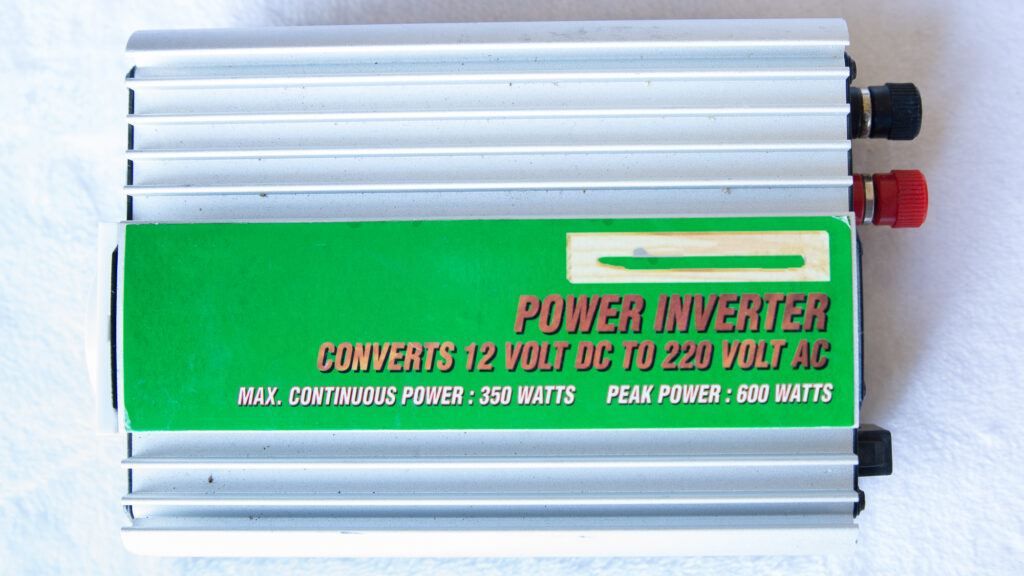
16cm x 12cm x 5cm (6.5” x 5” x 1.5”). Bought it 26 years ago before my first African Safari (eight days without electricity) and still going strong! Photograph by Tobie Schalkwyk
Pack extra batteries for your camera, headlamp, and anything else needing batteries (flash, laptop, etc.). Ensure that they’re in good order and won’t run down quickly.
Don’t forget to pack battery charger(s). If you will be at a spot where you will not have electricity for days, consider buying a small inverter that you can plug into your own/safari vehicle’s cigarette lighter. You can plug a common electrical extension cord and/or adapter into it and charge a variety of small batteries during drives. You may even score brownie points by sharing it with your ‘co-safarists’!
2. Extra Memory
We are so spoiled by our digital cameras using memory cards and other media that can store thousands of images. Even so, you may find yourself in a situation where you need a second card during a trip. For example, your memory card from the previous trip may still be in your memory backup device back at the camp or lodge (my camera’s second card slot saved me numerous times from this).
3. Cleaning Kit
Pack the necessary tools to clean your camera and lenses. Include a small towel to wipe your gear during or after a shoot (to remove dust or dampness). A small paintbrush is handy to clean all of the places difficult to reach by cloth.
4. Let There Be Light
You need light, especially if you’re going to do a night trip or astrophotography. Nothing is worse than fiddling around with setup or settings with a flashlight in one of your hands. Rather, opt for a headlamp. Make sure that it has a red-light option so you do not disturb others around you too much. It will also prevent you from accidentally lighting up unintended areas during long-duration shots.
You need light, especially if you’re going to do a night trip or astrophotography. Nothing is worse than fiddling around with setup or settings with a flashlight in one of your hands.
If you’re going to do night drives, take a strong flashlight with you to help find animals in the dark, or to keep light on your subject of choice when others move their light away from it.
5. An Image Backup Device
You will most likely not be able to keep all of your images on the memory media in your camera if you’re going on a week-long safari. Neither should you (in case your camera gets lost – yes, one of my cameras is still in a rock pool in the Drakensberg somewhere – or your memory card picks up an error).
I usually take my laptop with me on safaris and download all images every night. There are other smaller memory backup devices available on the market, though.
6. Filtered Water
Foreign water from a tap (no matter how clean it is) can upset your tummy and take days to recover. This can really mess up your trip. Take a few liters of freshwater with you if you won’t have access to the same at the camp/lodge.
7. Pack Protection
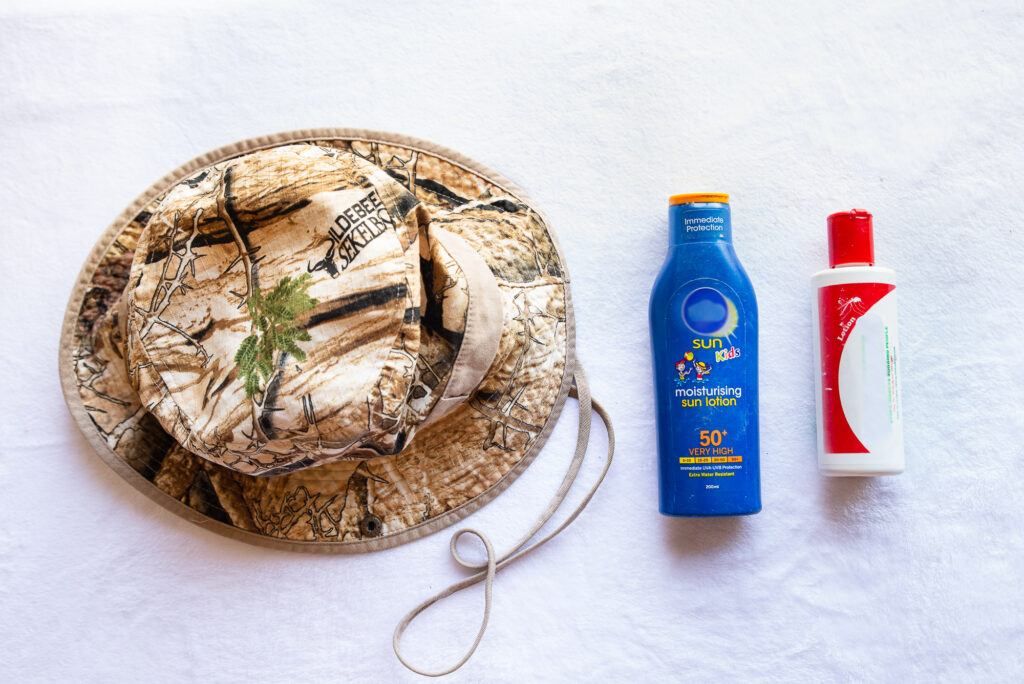
Hat, sunblock, mosquito repellent. Photograph by Tobie Schalkwyk
No, not ‘that’ kind of protection (wink-wink). I’m talking about protection:
- Against the sun:
The sun can be merciless on the back of an open vehicle and one bad scorching can really ruin the rest of your safari. Make sure that you pack sunblock with a high protection factor (50 or more).
Pack a sun hat (not just a cap). A nice camouflage version always looks nice on safari.
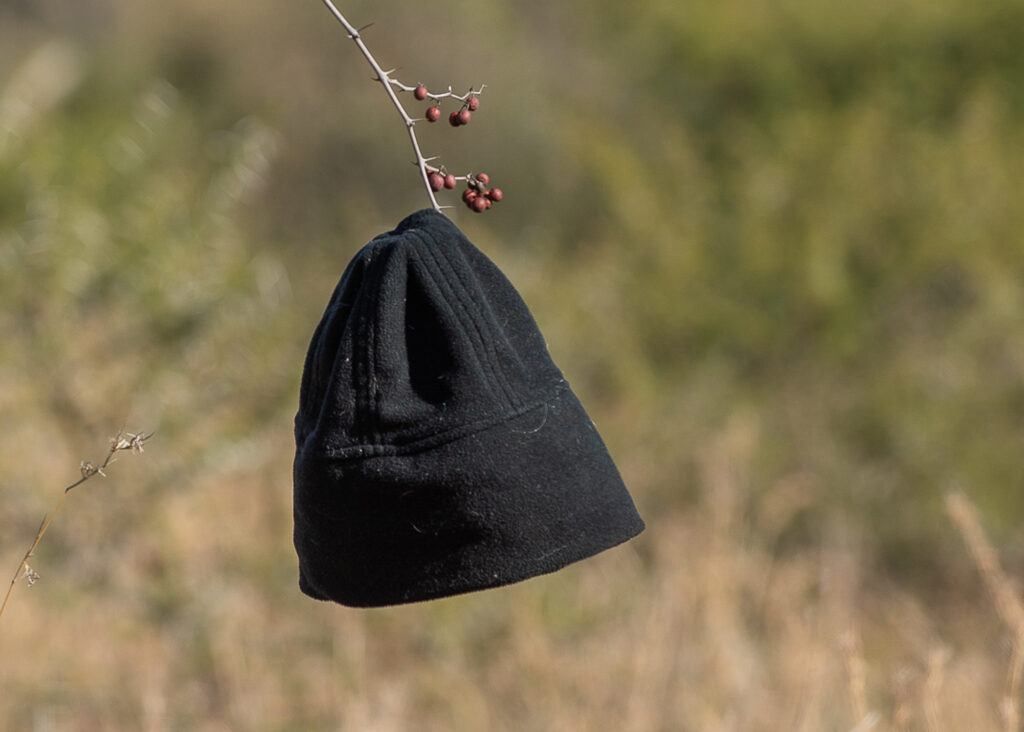
Another hidden protection offered by beanies: protective headgear, LOL! Photograph by Tobie Schalkwyk
- Against cold:
Take my word for it: temperatures on an open safari vehicle dips in no time to extreme levels after sunset. Excitement very quickly changes to extreme discomfort at the same rate if you’re not prepared.
Most open vehicle safari guides offer blankets to guests, but that is not enough. Pack:
- a warm beanie to protect your head and ears;
- a warm scarf to prevent cold from entering your upper body;
- a warm leather – or similar protection – jacket;
- long pants – denim have proven themselves through the years;
- warm shoes or hiking boots with thick socks; and
- warm gloves.
I know. You’re going to accuse me of overdoing it (especially after a scorching hot summer day) but just do it. You will thank me later.
Excitement very quickly changes to extreme discomfort at the same rate if you’re not prepared.
- Against water:
Some camera bags include a small raincoat to cover the bag in case of rain. If so: good! That is not enough, though.
Pack a thin plastic raincoat that can fold up as small as your hand. Rain on an open safari vehicle (and/or wet clothes) can be extremely unpleasant, even with a canopy mounted.
Pack a small plastic bag to protect your camera and lens from rain during a shoot.
- Against hungry critters:
Believe me, there are always a few hungry critters waiting on your arrival – not only around the campfire but even during the daytime. Pack a good deterrent. You never know when you’re going to need it.
8. Medicines
This is probably the most common neglected item of them all. Remember, you may not be able to get medicines for days. Cater at least for the following:
- A bad migraine
- An upset tummy
- A cold (quickly to pick up on a cold night/morning drive)
- Bad skin scratches
- Chronic medicine (very important!)
9. Pack a Full Range of Lenses
More about this in Tip #3: Preparation before every trip.
Key Lesson: One neglected essential item can ruin your whole safari, or at least make it extremely uncomfortable. Make sure that you will not regret leaving any of them at home. I’d rather have it with me and never use it than regret packing it.
Maybe you can help one of your co-safarists with it and make a friend for life. Or at least find a chocolate on your pillow when you decide it’s bedtime. Who knows?
Make a list of the essential items for your trip and check them off one by one before taking your trip.
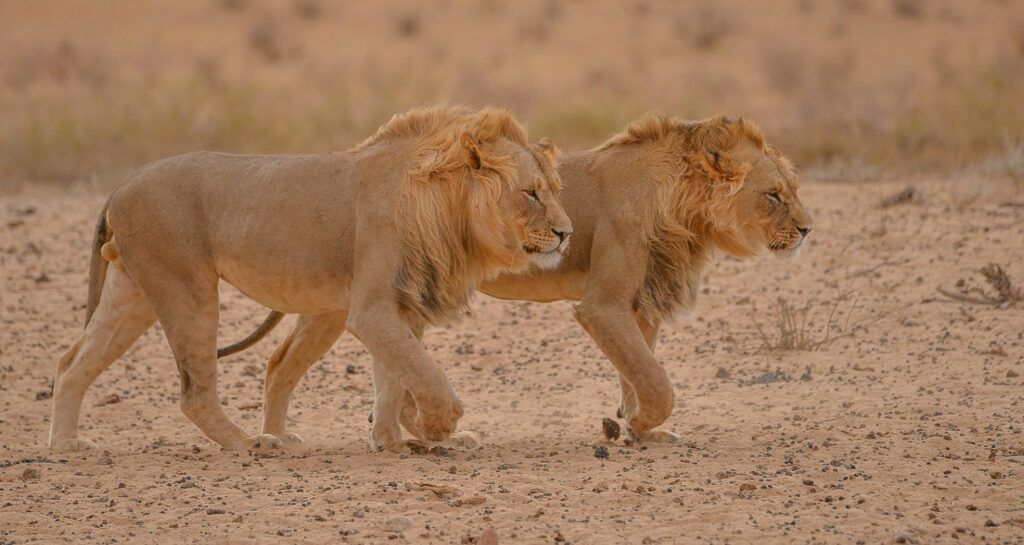
Photograph by Tobie Schalkwyk
Tip #3: Prepare Before Every Trip
Take my word for it, you will be tempted to join your ‘co-safarists’ around a campfire instead of editing your images, but do not fall for it. This preparation can make or break your next trip.
- Charge your camera’s batteries. Make sure that the battery in your camera as well as the backup battery are fully charged.
- Replenish all essentials as mentioned above.
- Pack lenses to cover the full range. This is not always possible, but preferably pack the following:
- A 24-70mm zoom lens
Wildlife tends to view a safari vehicle as part of the environment, so as long as you stay inside it (and not make sudden movements or noise), they may come right up to the vehicle – or simply ignore it. Some predators may even use the vehicle as cover while stalking prey, or prey may use the vehicle as cover to hide from predators.
So, what am I saying? That you are going to miss out if you do not have a 70-24mm zoom lens with you. Guaranteed.
- A 70-200mm zoom lens
This is a perfect companion for the 24-70mm lens if you’re photographing wildlife. Not only do they have enough reach in most situations, but they usually are pro (f/2.8) lenses, rendering excellent-quality images.
Another advantage of an f/2.8 lens is that you will be able to shoot images in the light offered by strong flashlight(s) at dusk or during night drives. This is a HUGE bonus!
- A lens with a range beyond 300mm
This is for the bird photographers. Blessed are you if you are not one of them as you will have much less to carry! Use this instead of the 70-200mm if you’re planning to shoot both wildlife and birds.
For the most fortunate, a 400mm/500mm/600mm prime lens will render super-quality images (with or without converters/extenders). For the rest of us, the 150-600mm offerings from Tamron and Sigma offer great, semi-affordable alternatives. By semi-affordable I mean quite pricey, but only a fraction of the cost of 400mm–600mm primes.
You may be in a position where you can only afford a kit lens with a reach above 300mm. So be it. Make the most of what you have.
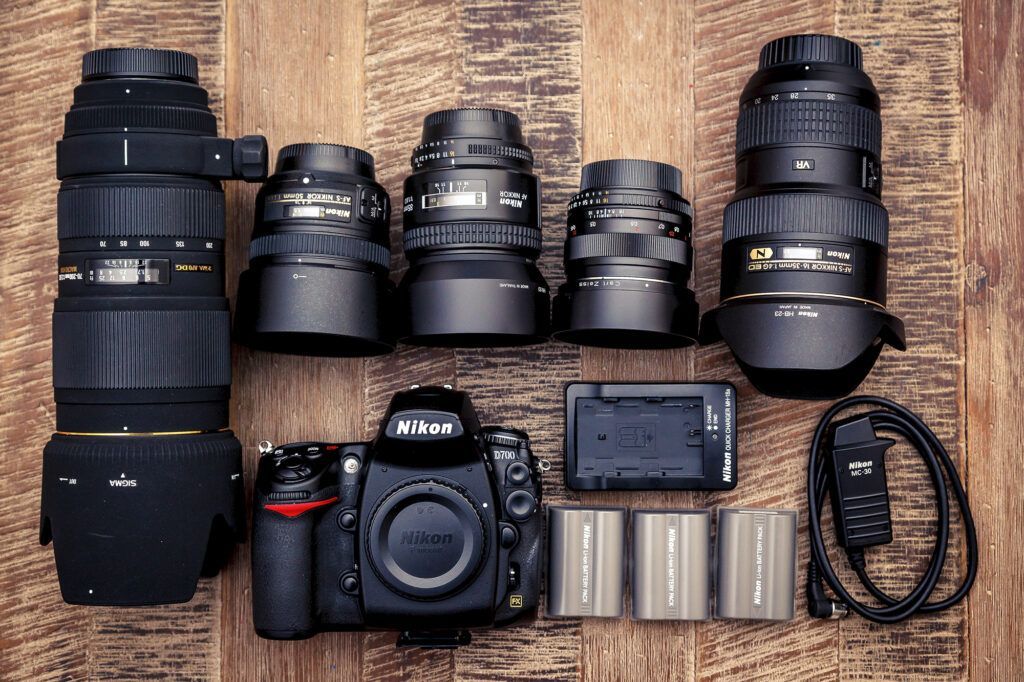
- Take multiple bodies if you can. The main advantage of this is that you reduce the need for changing lenses. If you have a crop sensor camera, it can also serve as a converter/extender by giving you 1.5x/1.6x perceived zoom. If your second camera is mirrorless, then you may want to make use of its advanced video capabilities. Some scenes are simply better on video than a still camera.
Key Lesson: Every trip has its own character with its own requirements. A night trip will need different items from a day trip. An astrophotography trip will have its own requirements. Just like for essentials, make a list of items for each type of drive and check each item off the list before each trip. You won’t regret it.
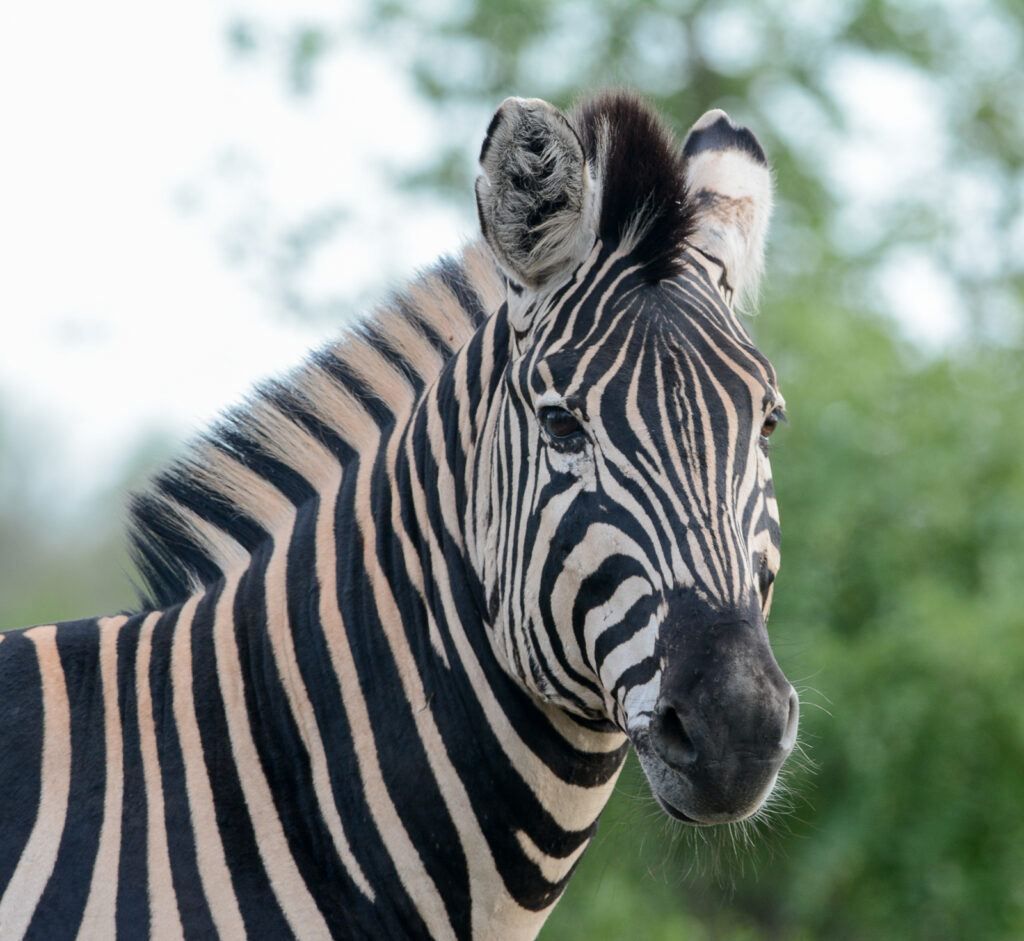
Photograph by Tobie Schalkwyk
Recommended Reading: Want to learn how to make your photos stand out from everyone else’s? Grab a copy of Photzy’s Effective Storytelling premium guide.
Conclusion
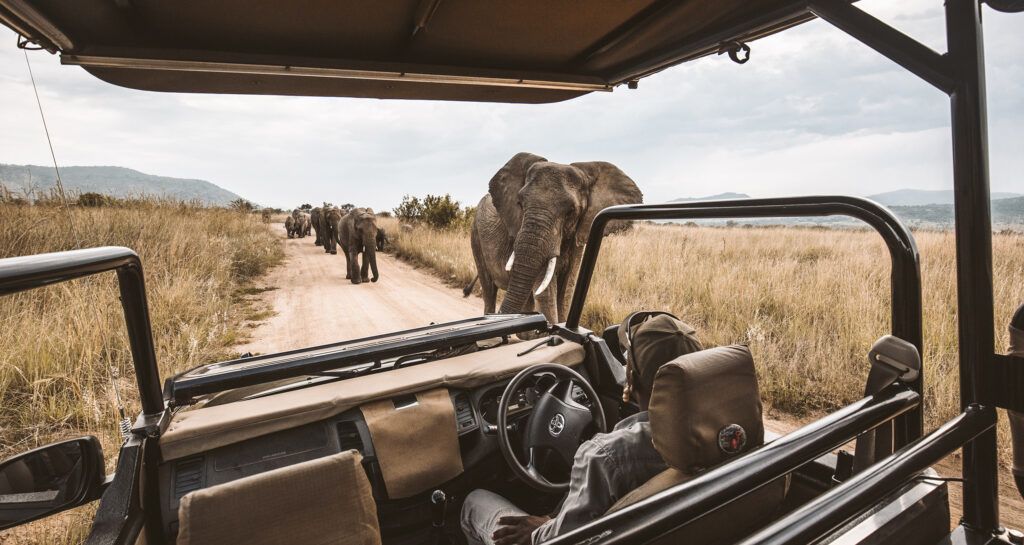
Preparation can make your African Safari an unforgettable experience. Neglecting it can do the same, for the wrong reasons.
If you are well prepared, you will be able to enter your safari relaxed and with confidence. And vice versa, of course.
Do it well. Make one or more checklists well in advance and check them thoroughly at the most appropriate time. It will reward you with a great safari experience.
Most of all, enjoy the safari preparation! It’s part of the event!
Self-Check Quiz:
- Name three types of protection you need to cater for.
- Is your camera weather sealed (so you can know its limits)?
- What shooting mode will you use during your safaris? Why?
- Why is a 24-70mm lens recommended?
- What is the main advantage of carrying multiple camera bodies with you?


